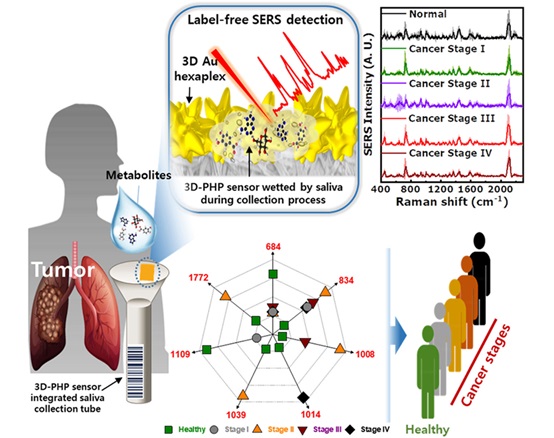Light-AI Cancer Diagnosis Technology Could Eliminate Need for Traditional Blood Draws and Biopsies
Posted on 21 Oct 2024
Numerous accounts exist of dogs barking at their owners so much that the owners suspected something was wrong, prompting them to visit a doctor and ultimately receive a cancer diagnosis. This phenomenon occurs because dogs possess an acute sense of smell, enabling them to detect metabolites, including volatile organic compounds (VOCs), present in human body fluids. Researchers are now working to apply these principles in developing a cancer diagnostic sensor.
A research team from the Advanced Bio and Healthcare Materials Research Division at the Korea Institute of Materials Science (KIMS, Changwon, South Korea) has created an innovative sensor material that enhances the optical signals of cancer metabolites found in body fluids (such as saliva, mucus, and urine) and utilizes artificial intelligence (AI) for cancer diagnosis. This technology allows for the quick and sensitive detection of metabolites and alterations in the body fluids of cancer patients, offering a non-invasive alternative to traditional blood draws or biopsies. The team successfully diagnosed colorectal cancer by using a plasmonic needle that amplifies the Raman signals of molecules. This needle is inserted through a 1-millimeter hole compatible with a colonoscopy camera, enabling the swabbing of the tumor's surface for composition analysis without causing bleeding.

Additionally, the researchers developed a method to collect saliva from lung cancer patients and categorize the cancer stage. The breath of individuals with lung cancer contains VOCs that differ from those found in healthy people. These compounds dissolve in saliva and are identified as lung cancer metabolites. The team has perfected a technology that employs paper-based sensors to differentiate between healthy individuals and lung cancer patients while also staging lung cancer using AI. This technology can detect signals from metabolites in body fluids with high sensitivity, utilizing plasmonic materials that enhance Raman signals by more than 100 million times, all without relying on traditional, complex, and costly equipment. AI analysis and mathematical modeling were employed to propose biomarkers for diagnosis.
Last year, the research team also developed a cancer diagnosis technology using urine. This year, they have advanced this technology to simultaneously detect multiple cancers in urine samples. The team analyzed urine from approximately 250 patients diagnosed with pancreatic cancer, prostate cancer, lung cancer, and colorectal cancer. They were able to conduct rapid analyses and utilize AI to determine results for 100 patients within about two hours. The research team reported achieving clinical sensitivity and specificity exceeding 98%. The findings of this study were published in two papers in the journal Biosensors and Bioelectronics, as well as in an article in Sensors and Actuators B-Chemical.
“The developed technology can be expanded not only to diagnose cancer, but also to diseases with poorly understood diagnostics, such as synaptic diseases,” said Dr. Ho Sang Jung from KIMS who is leading the research team. “We will enter the global diagnostic market based on domestic source technologies and take the lead in developing technologies that people can experience.”














